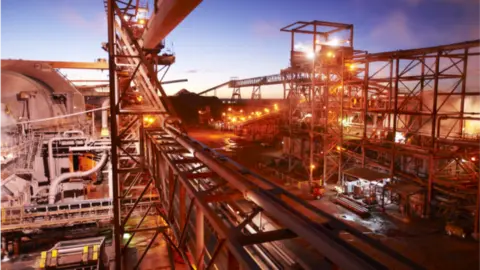BHP: Mining giant to leave London's FTSE 100 for Sydney
 BHP
BHPMining giant BHP is set to leave the FTSE 100 index after unveiling plans to scrap the dual listing of its shares in London and Sydney.
The company, part of the UK's blue chip index since 2001, will move its main listing to Australia as part of a huge shake up announcement on Tuesday.
BHP regularly tops the list of the FTSE 100's biggest companies, depending on fluctuations in market values.
The move will see some investor funds that track the FTSE sell BHP shares.
"Now is the right time to unify BHP's corporate structure," said Ken MacKenzie, chairman of the world's biggest listed mining comany. "BHP will be simpler and more efficient, with greater flexibility to shape our portfolio for the future.
"Our plans announced today will better enable BHP to pursue opportunities in new and existing markets and create value and returns over generations."
The move comes as BHP announced it was combining its oil and gas assets with Australia's Woodside, creating one of the world's 10 biggest producers of liquified natural gas.
BHP's chief executive, Mike Henry, is trying the shift the company's focus towards metals such as copper and nickel, and away from fossil fuels. BHP has also put its last thermal coal mine up for sale.
Pressure for change
Abandoning the dual listing unwinds a structure that has been in place since 2001, when Australia's BHP merged with the UK's Billiton. The company was known as BHP Billiton until 2017.
Consumer goods giant Unilever also abandoned its dual structure more than three years ago when it chose London above Amsterdam.
BHP told shareholders that its pre-tax profit had risen to £17.8bn in the last financial year, up from £9.8bn. It was the best annual profit in almost a decade, fuelled by soaring iron ore prices.
Under the merger of the oil and gas assets with Woodside, BHP shareholders will have a 48% stake in the new company.
BHP had come under pressure from some shareholders, notably activist investor Elliott Advisors, to simplify its structure.
Supporters of simplification argued it would make it easier for BHP to raise money, do deals, and return money to shareholders. But BHP had said any gains would be less than the cost of change.
On Tuesday, BHP's market value was about £128bn, second in size in the FTSE 100 only to drugs firm AstraZeneca, which is worth about £131bn. BHP is the biggest company on the Australian stock exchange.
Jamie Maddock, equity research analyst at Quilter Cheviot, said BHP's departure was bad news for UK-focused investors as some asset managers and index tracking funds would be forced to sell their shares.
However, the move will also reduce significantly the FTSE 100's exposure to the mining sector. Big news and developments in the mining sector can affect shares across the wider index.
